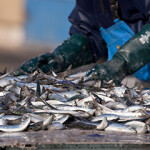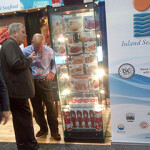Mowi, Seafood Scotland defend practices amid NGO investigation, chef boycotts

Scotland’s salmon-farming industry is defending itself against criticism from several Scottish chefs and NGOs concerned about fish welfare and environmental issues.
National trade and marketing body for the Scottish seafood industry Seafood Scotland, however, is defending the sector, pointing to a government report showing a decline in antibiotic usage among the country’s salmon farms.
Recent criticism of Scotland’s salmon-farming sector has come from several directions, including Lloyd Morse, co-owner and head chef of The Palmerston in Edinburgh, Scotland.
“Open net farms are plagued by parasitic sea lice, which disperse from the farms and can infect and kill migrating wild salmon and trout,” he said.
Morse called on fellow chefs and restaurateurs to join him in refusing to serve farmed salmon.
“We champion our suppliers who grow vegetables and raise animals in a wholesome and sustainable manner. I believe that farmed salmon is neither wholesome nor sustainable,” Morse told SeafoodSource. “I can't speak for other restaurants, but personally, I am not going to use factory-farmed, diseased fish.”
Scrutiny of the Scottish farmed salmon sector is also coming from U.K.-based NGO WildFish, which recently alleged that certification schemes, such as the Aquaculture Stewardship Council (ASC), Soil Association Organic, and the U.K. Royal Society for the Prevention of Cruelty to Animals (RSPCA) Assured credential – the latter of which is a U.K. certification that ensures farmed animal welfare – are misleading consumers as to the sustainability of certified farmed salmon they’re purchasing. To prove its claims, the NGO has presented undercover video footage of farmed salmon giant Mowi’s operations showing damaged and diseased fish.
Wildfish’s report, “Responsibly farmed? Investigating the certification of Scottish farmed salmon,” found “numerous examples of how certification of Scottish salmon requires lower environmental and welfare standards than could reasonably be expected by consumers,” it said.
Salmon originating from farms reporting mortality rates as high as 74 percent can place an RSPCA Assured “high welfare” label on their products in supermarkets across the U.K., according to WildFish.
The report documents examples of farms breaching certification standards while retaining their certifications, citing four Scottish salmon farms that surpassed ASC sea lice limits earlier this year that didn’t lose their certified status.
This is not the first time Mowi has been under fire from NGO investigations. WildFish and other NGOs made similar claims in July 2021, citing another batch of undercover footage at Mowi’s farm in Scotland. Mowi defended its animal welfare measures, and the RSPCA farm-animal welfare program – RSPCA Assured – determined in August 2021 there was no credible evidence of animal welfare violations.
Now, the salmon-farming giant has decided to ...
Photo courtesy of Wildfish/Corin Smith




Share